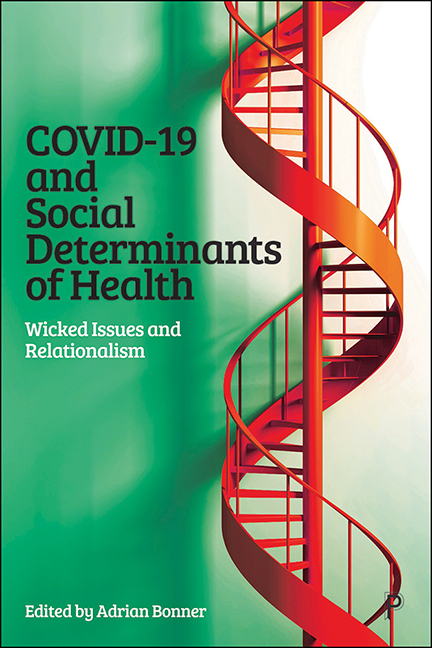Book contents
- Frontmatter
- Miscellaneous Frontmatter
- Contents
- List of figures and tables
- Notes on contributors
- Foreword
- Introduction
- Part I Wicked issues and relationalism
- Part II Regionalism and geopolitical environments
- Part III Public sector, COVID-19 and culture change
- Part IV The third sector
- Part V The case for relationalism
- Part VI Engagement and proposed changes
- Conclusion
- Appendix The Centre for Partnering
- Index
2 - Relationalism, wicked issues and social determinants of health
Published online by Cambridge University Press: 18 January 2024
- Frontmatter
- Miscellaneous Frontmatter
- Contents
- List of figures and tables
- Notes on contributors
- Foreword
- Introduction
- Part I Wicked issues and relationalism
- Part II Regionalism and geopolitical environments
- Part III Public sector, COVID-19 and culture change
- Part IV The third sector
- Part V The case for relationalism
- Part VI Engagement and proposed changes
- Conclusion
- Appendix The Centre for Partnering
- Index
Summary
Introduction
During 2020 and 2021, locking down communities, cities and countries was a public health intervention used in attempts to reduce the spread of the COVID-19 virus. Many people understood the need to reduce contact with others to reduce viral transmission, however, many objected to this threat to civil liberties either due to political reasons or the balance of risk between health and economic ruin. Sticking to the rules could mean loss of income, possibly leading to destitution or the intrinsic need to maintain social contacts with peers outweighing the need to isolate and comply with quarantine regulations. The importance of social contact to maintain mental health has become challenging during lockdown, particularly in the frail elderly at risk of dementia. The high death rate due to COVID-19 in care homes has been viewed as a moral and ethical crisis caused by government policies aimed at reducing the impact of the pandemic on acute health services, such as the National Health Service (NHS) in the UK, and ignoring the need to protect care homes from the epidemic during the first wave of COVID-19 transmission (see Case study 16.2). When this health threat to the older population in care homes was recognised they were locked down. The effects of locking down care homes, and lack of family contact for residents, particularly those with Alzheimer’s disease, has been well-publicised (Anon, 2020a).
In the young, the fear of missing out changes the perception of risk such that socialising is more important than the need to adhere to guidelines and regulations designed to reduce the spread of the virus among the more vulnerable members of a family or community.
During COVID-19 there was a heightened awareness that healthy relationships are a key driver of health and wellbeing. Social epidemics in the 21st century were linked to stress-related depression (in pre-COVID-19 times), the second most significant health burden in the world (Parnham, 2018). Lifestyle choices contribute to modern non-communicative diseases, including cancer, heart disease, stroke, respiratory disease and liver disease (Murray et al, 2013).
- Type
- Chapter
- Information
- COVID-19 and Social Determinants of HealthWicked Issues and Relationalism, pp. 41 - 55Publisher: Bristol University PressPrint publication year: 2023



